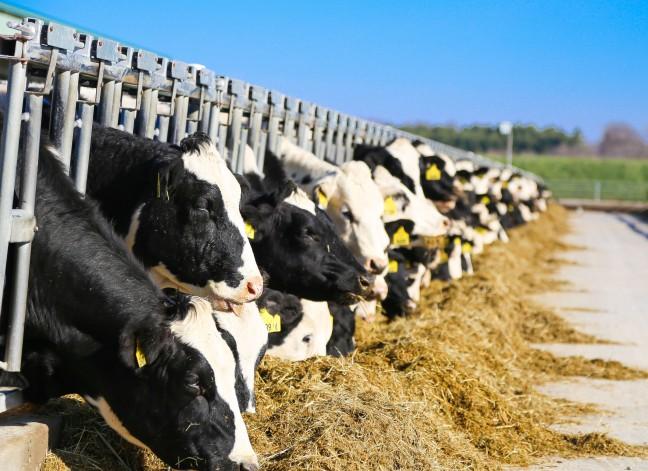Throughout history, Wisconsin established itself as a diary production powerhouse. From fried cheese curds, to the foam hats dawned by Packers fans, dairy products are an integral aspect of Wisconsin’s state culture. Yet according to the Wisconsin State Journal, 915 Wisconsinites committed suicide in 2017, and a startling number of those who took their own lives shared one striking commonality: they were dairy farmers.
John Peck, executive director of Family Farm Defenders, said the state has lost half of its dairy farmers since 2004. The loss can be attributed to many interacting factors, including intense financial strains that lead some to sell their business and exit the industry, according to the Wisconsin Department of Agriculture, Trade and Consumer Protection. However, Peck said peak rates of suicide and depression among dairy farmers are an important part of that story as well.
The increase in suicides among dairy farmers can be seen as the byproduct of several economic hardships in the state, many of which stem from the low milk prices, Peck said.
“Farmers aren’t getting a fair price for what they produce,” Peck said. “The milk prices are the worst they’ve been in ten years.”
Frank Friar, an economic specialist at the Wisconsin Department of Agriculture, Trade and Consumer Protection, explained that what once was a healthy and stable industry has cracked under the weight of its own production.
Friar stated that as farmers have become more efficient in producing milk, they have also produced a surplus of dairy and consequentially, the prices offered to farmers for their products have plummeted.
“Farmers were pretty assured of having a home for their milk. The tides have turned … we have … too much production, not enough people drinking milk, and the trade issues of today,” Friar said.
The “trade issues of today” refer to the U.S.’ ongoing trade war with China, which has had a severe impact on the industry, he explained.
Peck said Wisconsin was set to receive a total of $10 million in relief money for the state’s farmers, but that has yet to materialize.
“There are only 11 farms that received $50,000 each, 237 [farms] got less than $100,” Peck said. “62 farms go less than $20 … one farm got only $1.”
Yet, Peck believes that while today’s crisis is in-part the culmination of overproduction and international trade discrepancies, there is significant blame to be placed on larger corporations that play a role in the dairy industry. Peck said large processors have been offering lower prices to farmers for their milk, and importing of dairy from out-of-state, as they can purchase more for less.
Peck attributes the drop in imported milk prices to what he describes as a monopolization of food production by large corporations, and their ability rig costs for their benefit, at the expense of farmers.
“In Chicago, they set all the world food process at CME … Corporations can manipulate prices … companies like Dean Foods are paying farmers less for their milk, but prices aren’t changing in stores,” Peck said.
Large companies have been importing milk from Michigan for years, according to Friar, who acknowledged that this business decision has been harmful to Wisconsin’s dairy farmers.
Friar lamented that the current economy is such that imported milk has been making its way into Wisconsin’s dairy processing plants, but also made clear that he feels no anger towards the states which export their milk to Wisconsin.
“Processors have been bringing milk in from Michigan all along … that’s a business decision they can make,” Friar said. “We’re not trying to start a war with Michigan … I think it’s a free enterprise system and supply and demand is sometimes a cruel concept.”
Yet, as companies sell products made from imported milk, consumers across Wisconsin buy their products under the guise of helping local small businesses, Peck said. He took issue with the “Something Special from Wisconsin” label that often appears on dairy products throughout the state, as he believes it misleads the public as to where their dairy actually comes from.
Wisconsin company uses cheese to support UW student-athletes
Peck said that the “Something Special from Wisconsin” label is part of a DATCAP program aimed at promoting the sale of Wisconsin-made products, including dairy products. He discussed the program’s rule that over 50 percent of production must occur in the state of Wisconsin for a good to receive the “Something Special,” designation.
Peck stated that large companies will import the actual milk to make dairy products from out of state, but process it and or make cheese, yogurt, or ice cream in Wisconsin, earning a “Something Special” label without getting milk from Wisconsin farmers.
As the price of milk continues to drop, forcing more dairy farmers into bankruptcy and ultimately driving the rise in suicides, activists and state officials alike are offering possible solutions to keep Wisconsin’s dairy industry alive.
Peck offered solutions of his own to aid Wisconsin’s dairy industry, emphasizing the need for farmers to control the market.
“Farmers need a fair price,” Peck said. “Some of that comes with management. Farmers need to get together and decide on how much to make. The Department of Justice can make sure that prices aren’t manipulated … they need to enforce anti-trust law … and actually let farmers control the market … DATCAP could get more involved and have better consumer labeling.”
Whatever the solution may be, it is abundantly clear that the fabric of Dairyland is in jeopardy, and Wisconsin’s farmers are paying the ultimate price.
Mar. 5, 4:31 p.m.: This story has been updated to include clarifying information from the Wisconsin Department of Agriculture, Trade and Consumer Protection.


